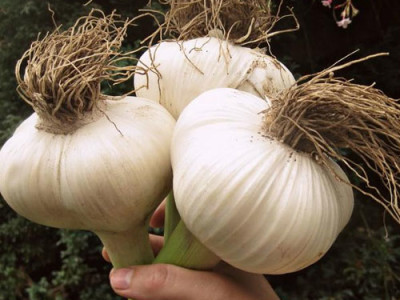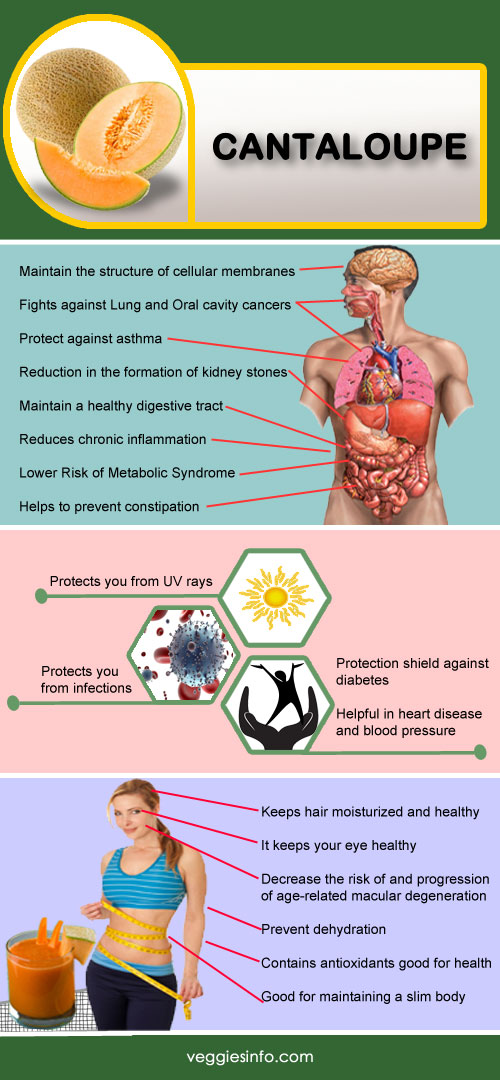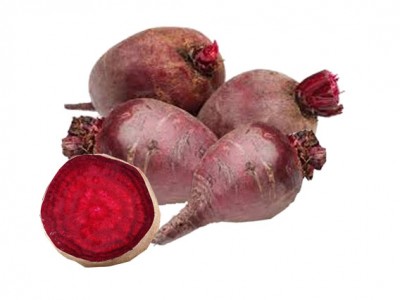

Cantaloupe – Health Properties , Nutrition Guide
About Cantaloupe
Cantaloupe also scientifically known as cucumis melo belongs to cucurbitaceae family. In India and United States it is popularly known as musk melon, mush melon, sweet melon, or even Persian melon. The history has it that cantaloupe was first cultivated in Europe. Originated in Iran,India and Africa some 5000 years back. California is one of the largest cantaloupe producing countries in the world ranking above Arizona, Colorado, Georgia, Indiana and Texas. It has a high water content that helps you keep your body hydrated and also makes you feel full until next meal. They are one of the most popular melons from the melon family and the most nutritious as well.
Cantaloupe Nutrition Facts
- One cup of diced melon (about 156 grams) contains 53 calories, 0.3 grams of fat, 13 grams of total carbohydrate, 12 grams of sugar, 1.4 grams of fiber, 1.3 grams of protein, 106% the daily value for vitamin A, 95% vitamin C, 1% of calcium and 2% of iron needs.
- A one-cup serving also provides 5%, or more of the daily value needs for vitamin K, niacin, vitamin B-6, folate, magnesium and potassium.
- Cantaloupe contains an abundance of antioxidants including choline, zeaxanthin, and beta-carotene, all of which provide protection against a range of diseases and conditions from the common cold to cancer.
Cantaloupe Benefits
- Protect against asthma.
- Helps to prevent constipation.
- Prevent dehydration.
- Reduces chronic inflammation.
- Keeps hair moisturized and healthy.
- Decrease the risk of Heart diseases and progression of age-related muscular degeneration.
- Reduction in the formation of kidney stones.
- Prevent constipation.
- Maintain a healthy digestive tract.
- Maintain the structure of cellular membranes.
- Fights against Lung and Oral cavity cancers.
- It keeps your eye healthy.
- Protects you from UV rays.
- Protection shield against diabetes.
- Helpful in heart disease and blood pressure.
- Protects you from infections.
- Contains antioxidants good for health.
- Good for Maintaining a Slim Body.
- Lower Risk of Metabolic Syndrome.
Cantaloupe Interesting Facts
Cantaloupe are named for the papal gardens of Cantalupo, Italy, where some historians say this species of melon was first grown.
| Principle | Nutrient Value | Percentage of RDA |
|---|---|---|
| Energy | 34 Kcal | 1.5% |
| Carbohydrates | 8.6 g | 6.5% |
| Protein | 0.84 g | 1.5% |
| Total Fat | 0.19 g | <1% |
| Cholesterol | 0 mg | 0% |
| Dietary Fiber | 0.9 g | 2.25% |
| Vitamins | ||
| Folates | 21 µg | 5% |
| Niacin | 0.734 mg | 4.5% |
| Pantothenic acid | 0.105 mg | 2% |
| Pyridoxine | 0.072 mg | 5.5% |
| Riboflavin | 0.026 mg | 2% |
| Thiamin | 0.017 mg | 1% |
| Vitamin A | 3382 IU | 112% |
| Vitamin C | 36.7 mg | 61% |
| Vitamin E | 0.05 mg | 0.5% |
| Vitamin K | 2.5 mcg | 2% |
| Electrolytes | ||
| Sodium | 1 mg | 0% |
| Potassium | 267 mg | 6% |
| Minerals | ||
| Calcium | 9 mg | 1% |
| Copper | 41 µg | 4.5% |
| Iron | 0.21 mg | 2.5% |
| Magnesium | 12 mg | 3% |
| Manganese | 0.041 mg | 2% |
| Zinc | 0.18 mg | 1.5% |
| Phyto-nutrients | ||
| Carotene-alpha | 2020 µg | — |
| Crypto- xanthin- beta | 1 µg | — |
| Lutein- zeaxanthin | 26 µg | — |
Cantaloupe is rich in flavour and very low in calorie that is 100 g of cantaloupe has just 34 calories and fats. Apart from its low calorie content musk melon also has vital components such as vitamins, minerals, and also poly – phenolic acid; a compound derived from the plant. Vitamin A rich foods such as cantaloupe are known for their anti oxidant properties that fight against cancer and also cancer pertaining to oral cavity. Anti oxidant flavonoids such as zea xanthin that helps fight various kinds of cancer such as prostate cancer, breast cancer, colon cancer, lung and pancreatic cancer. Zea -xanthin is also known for protecting the body against UV rays which are known to harm the eye and skin as they come directly in touch with it. Fast pace life is inviting a lot of heart diseases and blood pressure needs to be kept under check constantly. Cantaloupe should be added in ones diet in order to fuel the body with required nourishments. Due to its low calorie content this food is recommended for diabetic patients as well. Body is prone to infections very easily keeping in mind the contamination of food air and water that is wide spread, vitamin C rich cantaloupe helps in protecting the body against infections.
How To Enjoy Cantaloupe
Everyone has their own way of enjoying this food. Juicy and full of flavour this food is the best way to beat the heat. Cut open cantaloupe and scoop the seeds out to enjoy an uninterrupted delightful experience. The seeds of this food can be drained using a strainer and then dried and consumed as low calorie snack. Indian culinary experts use these seeds in order to replace them with cashew nut in rich gravies. This is a cheat way to maintain good taste and be diet friendly. Cantaloupe is used in salads with feta cheese and bell peppers in order to make a light and healthy snack. Juice of
cantaloupe is a drink with goodness of health. Innovations are being made with cantaloupe to increase its consumption in all forms, popsicles made of cantaloupe flavour are the best way to indulge in some bright coloured refreshment.
Cantaloupe can benefit your health in many ways and it is possibly the most versatile food that suits everyone’s palate.



